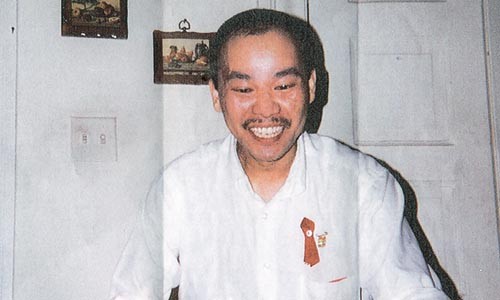On June 18, nearly one month after Nang "Ricky" Nguyen was killed by a Pittsburgh police officer, all that remained in his third-floor studio apartment was a stripped twin-sized mattress, a bit of furniture -- and a deep sense of regret. Nguyen's longtime friend, Allen Wolk, had been cleaning out the apartment, but he was far from clearing his mind about his friend's death, and whether it could have been avoided.
On May 23, Nguyen, 46, was shot and killed by an officer on Atwood Street, just steps away from his Oakland apartment. He had threatened his landlord and waved a meat cleaver in the air, according to news accounts.
But Wolk, 61, says the altercation at the corner of Atwood and Bates streets didn't have to end in Nguyen's death. Nguyen had a history of mental illness and other medical problems, according to Wolk, who says the two met at a local church dinner nearly two decades ago. Wolk believes the standoff could have been avoided if state law made it easier to involuntarily commit people with mental illness.
"Proving [someone is a threat] is so difficult," Wolk laments.
Wolk says Nguyen suffered from increasingly frequent outbursts over the past year, that his appetite had disappeared and that his speech had become slurred. Then, during a visit to Nguyen's apartment in late February, Wolk says he found his friend screaming curses and refusing to eat. Nguyen then used a knife to gouge the back [[the word choice here [[the of a chair.
Afterwards, Wolk says he tried several times to have Nguyen involuntarily committed to Western Psych. Wolk called Allegheny County's mental-health crisis center and visited the hospital to fill out a petition for what is called a "302 commitment."
The state's 31-year-old Mental Health Procedures Act decrees that individuals can be involuntarily committed to a mental hospital only if they pose "a clear and present danger of harm" to others or themselves. If Nguyen had attempted suicide, or attacked someone else within the previous 30 days -- or if Wolk could prove Nguyen, if unattended, would suffer "death or serious physical debilitation ... within 30 days" -- the county could commit Nguyen. But Nguyen had attacked nothing more than a chair, and Wolk's request went nowhere.
Marge Lubawy, spokesperson for the county's Department of Human Services, was not able to speak specifically about Nguyen's case. But in general, she says, the 302 commitment law walks a "fine line." Even if someone says he's going to kill himself or others, she says, that alone isn't enough to have him involuntarily committed.
"They have to take further action," she says, such as reaching for a weapon. "Verbal threats don't do it. People say [threatening] things all the time in the heat of anger."
Lubawy acknowledges that some might think waiting for physical threats might be too late. But the law, she says, is meant "to keep people from throwing their neighbors into mental hospitals."
Wolk says that a week after the chair incident, a case manager from Western Psych committed Nguyen to the hospital. (For confidentiality reasons, Western Psych officials could not speak about Nguyen's case.) But though Nguyen was released in late March, Wolk says, he soon resumed his downward spiral. When Wolk visited Nguyen just a few days before he was shot, "I saw that he had two gashes [on his forehead] with congealed blood," Wolk says. "I said, 'What happened, Ricky?' After he stopped swearing, he said that he had gotten into some kind of fight.'"
Wolk asked whether he wanted to go to the hospital. Nguyen refused.
"I thought, 'Well, I won't be able to 302 him,'" Wolk recalls.
Despite the blood, Wolk figured county officials would consider Nguyen's behavior less threatening than it had been in February. So instead of trying to commit Nguyen, Wolk says he left messages with case managers at Western Psych, "praying that they could do something."
The next day, Wolk went to New York with his family. When he returned on May 23, he had six messages on his home answering machine. Some were from Nguyen's friends. One was from the medical examiner's office.
Could Nguyen's death have been avoided if it were easier for friends to have him hospitalized?
"It can never be a perfect law," says Christina Newhill, associate professor for the University of Pittsburgh's School of Social Work. "You're balancing an individual's civil rights with public protection."
"It can be very frustrating" for friends and family members of those with a mental illness, she continues. "But clinicians have to make decisions according to the law."
Wolk says he certainly understands the need to protect the rights of the mentally ill. But looking back, he wishes he had lied about Nguyen's behavior, claiming his friend had tried to harm him.
"That's what he needed, and I didn't do it," says Wolk, sitting in the middle of Nguyen's nearly vacant bedroom, his eyes wet. "I wish I had."















